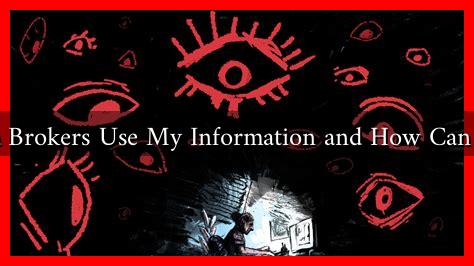-
Table of Contents
How Do Data Brokers Use My Information and How Can I Stop Them?
In today’s digital age, personal information is a valuable commodity. Data brokers, companies that collect and sell consumer data, play a significant role in this ecosystem. Understanding how they use your information and what you can do to protect your privacy is crucial. This article delves into the operations of data brokers, the implications for consumers, and actionable steps to regain control over your personal data.
What Are Data Brokers?
Data brokers are entities that gather information from various sources, including public records, online activity, and social media. They compile this data into detailed profiles that can be sold to businesses, marketers, and even government agencies. According to a report by the Federal Trade Commission (FTC), there are over 4,000 data brokers operating in the United States alone.
How Data Brokers Use Your Information
Data brokers utilize your information in several ways, often without your explicit consent. Here are some common practices:
- Targeted Advertising: Data brokers analyze consumer behavior to create targeted advertising campaigns. For instance, if you frequently search for fitness products, you may start seeing ads for gym memberships or health supplements.
- Credit Scoring: Some data brokers provide information to credit agencies, which can influence your credit score. This can affect your ability to secure loans or mortgages.
- Risk Assessment: Companies use data broker profiles to assess the risk of potential customers. For example, insurance companies may use this data to determine premiums based on perceived risk.
- Employment Screening: Employers may use data broker services to conduct background checks on potential hires, which can include information about your social media activity and public records.
The Implications of Data Broker Practices
The practices of data brokers raise significant privacy concerns. Here are some implications for consumers:
- Loss of Privacy: Many individuals are unaware of the extent to which their data is collected and sold. This lack of transparency can lead to a feeling of vulnerability.
- Data Accuracy Issues: Data brokers may not always have accurate information. Incorrect data can lead to wrongful denials of credit or employment opportunities.
- Identity Theft Risks: The more data brokers know about you, the higher the risk of identity theft. Personal information can be exploited by malicious actors.
How to Stop Data Brokers from Using Your Information
While it may be challenging to eliminate your data from the internet entirely, there are steps you can take to minimize your exposure:
- Opt-Out Requests: Many data brokers allow consumers to opt out of their databases. Websites like Privacy Rights Clearinghouse provide resources and guides on how to opt out from various data brokers.
- Limit Social Media Sharing: Be mindful of the information you share on social media platforms. Adjust privacy settings to restrict who can see your posts and personal details.
- Use Privacy-Focused Services: Consider using search engines and browsers that prioritize user privacy, such as DuckDuckGo or Brave.
- Regularly Monitor Your Credit Report: Keep an eye on your credit report for any inaccuracies or unfamiliar accounts. You can obtain a free report annually from each of the three major credit bureaus.
Conclusion
Data brokers play a significant role in the modern economy by collecting and selling personal information. While their practices can lead to targeted marketing and other benefits, they also pose serious privacy risks. By understanding how data brokers operate and taking proactive steps to protect your information, you can regain control over your personal data. Remember, knowledge is power, and being informed is the first step toward safeguarding your privacy in an increasingly data-driven world.

